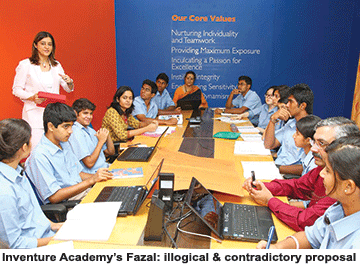Karnataka: Empire strikes back
AN OUT-OF-THE-BLUE proposal of the Karnataka state government to cap tuition fees chargeable by private schools across the board — pre-primary, primary, secondary, and higher secondary — has created a furore within the state’s 11,475 private unaided (financially independent) schools. A “draft fees structure” posted on the website of the department of public instruction (DPI) on September 30, proposes a ceiling of Rs.11,500, Rs.6,800 and Rs.13,130 per year as the maximum chargeable tuition fees of pre-primary, primary and secondary schools in the state. This proposed ceiling is also applicable to schools affiliated with the pan-India CBSE and CISCE examination boards which are usually exempted from state government legislation. Moreover, ‘development fees’ levied by private schools have also been capped at Rs.10,000 per year, with all fee hikes subject to approval by a majority of parents. The DPI has invited private schools to file their comments and objections to these proposals by November 10.
WITH TUITION FEES IN bangalore’s high-end international day schools as high as Rs.4 lakh per year and of CBSE and CISCE-affiliated schools averaging Rs.50,000-100,000 per year, the DPI’s fees-capping proposal has drawn scorn and derision. On October 16, the Karnataka Unaided Schools Management Association (KUSMA) and the Associated Managements of English Medium Schools in Karnataka (KAMS) lodged an official complaint with the DPI against the “impractical proposal” and zero representation of CISCE/CBSE or state board-affiliated private unaided schools in the sub-committee constituted by it for drafting the new fees structure.
“We don’t know on what basis the DPI has come up with such an absurd fees structure. Currently, tuition fees charged by private unaided schools in Bangalore vary between Rs.15,000-1 lakh per year. Uniform fees cannot be mandated for all private schools in each sector. Parents who protest against tuition fee increases need to realise that if private schools begin charging the DPI prescribed fees, we will very quickly transform into under-equipped and under-performing government schools,” says Shashi Kumar, general secretary of KAMS, which has a membership of 600 private schools statewide.
The proposed cap on tuition fees is only the latest instance of continuous interference and official harassment heaped upon private unaided schools by successive governments of the state for over two decades. In 1994, the government passed an ordinance prohibiting the promotion of new English-medium schools. Only schools offering Kannada or mother tongue as the medium of instruction in primary classes (classes I-V) were licenced and ‘recognised’ by the state government. Unsurprisingly, this directive was practiced more in the breach than observance, and Karnataka’s notoriously corrupt educracy had many field years shaking down private school managements for turning a blind eye to their providing English medium primary-secondary education in a state which has a long tradition of English education.
After a long battle in the courts, the educracy’s party was interrupted by a judgement of the Karnataka high court in 2008, which quashed the government’s 1994 ordinance as being violative of parents’ fundamental right to choose the medium of instruction of their children. Subsequently on May 6, the Supreme Court upheld the Karnataka high court verdict.
Quite obviously, the temerity of private school managements moving the courts to cut off a lucrative income stream hasn’t gone down well with the educracy which has hit back by capping their tuition fees at ridiculous levels out of touch with all market realities. Moreover, despite the unambiguous Supreme Court judgement, incorrigible education ministry officials continue to harass private school managements, insisting they are ‘unrecognised’ for teaching in English. Following child molestation incidents in Bangalore’s Vibgyor and Orchid International schools, education officials contend they are guilty of operating illegally as they were licenced to teach classes I-V in the Kannada medium.
Comments Nooraine Fazal, co-founder and CEO of the CISCE-affiliated Inventure Academy, Bangalore (annual tuition fee: Rs.1.8-3 lakh): “Given the rising demand for quality English-medium education in Karnataka, the state government must encourage the promotion of private schools at all price points. The DPI’s latest one-cap-fits-all tuition fees proposal is illogical and contradicts guidelines laid down by the education department pertaining to infrastructure provision, safety requirements, student-teacher ratio, and minimum wages for teachers. Moreover, parents protesting rising tuition fees need to realise that quality education comes at a price.”
But such rational counsel is unlikely to cut much ice with Karnataka’s command and control politicians and educracy long accustomed to lording it over private schools. The empire is determined to strike back.
Prayank (Bangalore)















Add comment